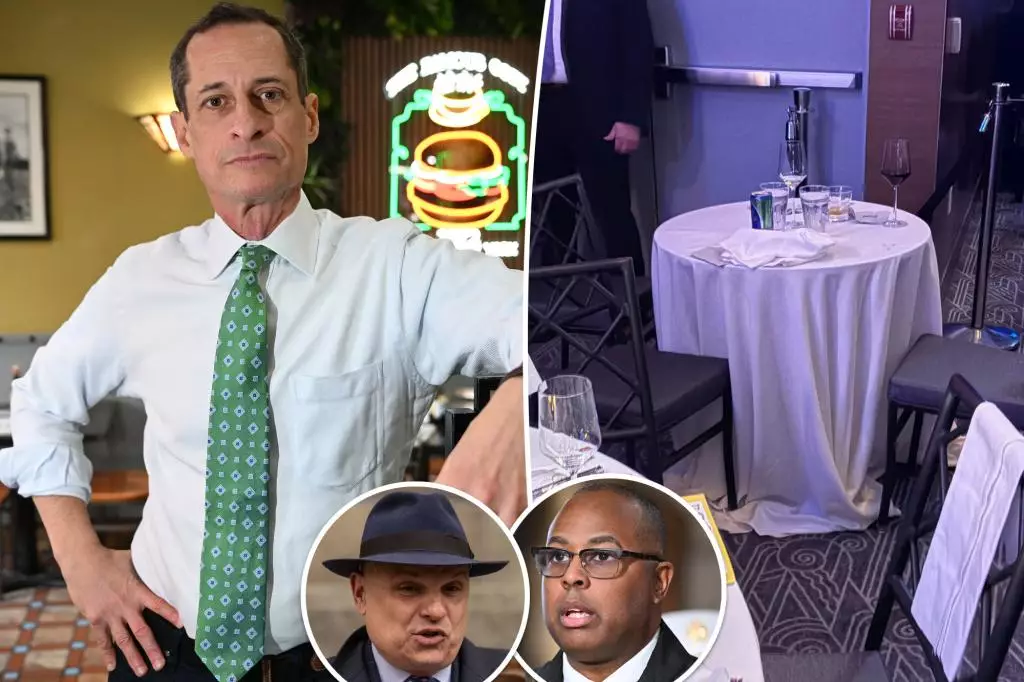In the realm of New York City politics, the Inner Circle dinner is an iconic gathering, where the serious and the comedic intermingle amidst glittering socialite glamour. Yet, even amid the grandeur and humor, certain guests must contend with the realities of social hierarchies—especially when one of those guests is former Congressman Anthony Weiner. His seating arrangement at this year’s gala raised eyebrows, not necessarily for political prowess, but comic irony. Placed at what some cheekily referred to as the “kids’ table,” Weiner’s return to the public eye is fraught with both laughter and lingering questions regarding his political aspirations.
The visuals were unmistakably symbolic: a diminutive table meant for three, merely a few feet away from the larger tables that housed New York’s glitterati. An insider’s remark about Weiner being relegated to the “small Weiner table” adds an additional layer of humor—one that reflects the broader societal tendency to mock rather than analyze. When Weiner departed early from the gala, it signaled more than just a preference for family time; it echoed the mythos of his prior scandals, rendering him a perpetual figure of both intrigue and ridicule.
The Fallout from Political Fame
Weiner once stood at the peak of his political career, representing New York’s 9th congressional district with vigor and charisma. However, the series of sexting scandals that led to his resignation did more than derail his political ambitions; they cemented his status as a cautionary tale in the annals of modern politics. Now, as he embarks on a campaign for City Council, his experiences in the media fishbowl might have equipped him with unique insights, but they have equally burdened him with public skepticism.
The peculiarities of Weiner’s latest public outings—itself a calculated maneuver—serve as reminders of his complex relationship with fame. Previously seen space occupied exclusively by honored guests has now become fraught with complexity when Weiner is involved. The ridicule he faces today is not just about his seating arrangements but serves as a constant reflection of the duality of his existence: an aspiring politician grappling with the ghosts of political misdeeds.
Colorful Characters: Aidala and the Inner Circle
In the swirl of political glitz, attorney Arthur Aidala emerges as a colorful character with deep ties to both Weiner and the Inner Circle. His recollections of the event reveal a genuine connection to Weiner as a friend and ally, but also offer insight into the web of relationships that define political life in New York. A seasoned presence within the gala, Aidala’s comment about the seating mix-up being an “honest mistake” unearths the complexities of event planning amongst a crowd of high-stakes personalities.
Aidala’s defense of Weiner paints him in a more favorable light—one of loyalty and camaraderie—at a time when being associated with Weiner might yield more public criticism than accolades. This dynamic reveals the challenges of navigating social strata in political spaces, where relationships can shift drastically based on public opinion and individual reputations. The affection Aidala expresses for Weiner signifies that behind every political scandal, there are human stories marked by loyalty and resilience.
New York’s Evolving Political Landscape
The Inner Circle dinner this past season was more than merely a stage for Weiner’s mockery. It spotlighted current political heavyweights like Mayor Eric Adams and former Governor Andrew Cuomo, showcasing a new generation of leaders who must continuously dance on the precarious stage of public perception. The juxtaposition of Weiner’s presence against contemporary issues makes one contemplate whether the past can ever fully be disentangled from the present.
What’s striking is the role of humor—a powerful political tool that serves to both unite and dissect. The roast of prominent figures at the gala exemplifies how humor can act as a pressure valve in the intensely charged atmosphere of political discourse. If a powerful presence like Weiner can be laughed at, what does that say about the very nature of power in this context? Humor undermines authority, yet it simultaneously pulls the realm of politics closer to the people, democratizing narratives that otherwise would remain shrouded in formality.
In a world where scandal seems to trump first-rate political achievements, Weiner’s return signifies a reckoning. Can redemption be scripted in the annals of political theater, or is he confined to a prominent role in a comedic shadow of his former self? The narratives we build around figures like Weiner are noteworthy—not merely for the laughter they generate but for the dialogues they ignite in an ever-evolving political landscape.

